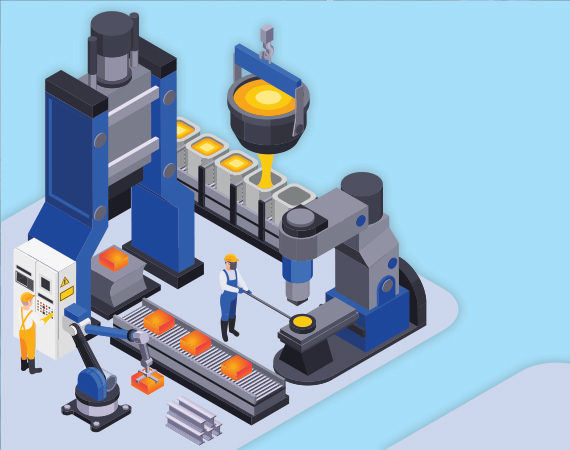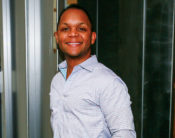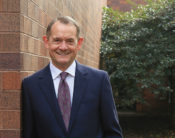Tom Renk was just looking to create a few smiles that day. He figured he’d put on a super hero costume, show up at the Special Olympics and hopefully bring an added element of fun to an already profound and impactful event.
But when an autistic boy spotted Renk from across the field and walked straight toward him, it was clear Renk’s gesture was creating more than just smiles. He was creating memories.
“We were on the track and he was walking toward me,” Renk recalls recently from his Winona foundry, Alliant Castings. “And he comes up to me and he gives me a big hug. And he puts his hands on my head, and I didn’t know what he was going to do. But, you know … I just stood there. And he was staring at me. And it was really, really powerful.”
Renk is a fan of Marvel comics. He loves Iron Man and the Iron Man films. After spotting a few Iron Man costumes online, Renk scooped them up, including the red, white and blue one worn by the Iron Patriot in the Marvel films. That’s the one he wore to the Special Olympics, a cause that is dear to his heart.
What does any of this have to do with manufacturing and the success and growth of Alliant Castings?
Nothing.
And everything.
For Renk, being connected to the community is just as important as being financially successful in the community. Winona is his home; it’s where he’s raised his children, and where he’s built a company into one of the most innovative in its industry. He believes he’s successful because of the community—and because of the hard-working people that work there.
The story of Alliant Castings is one of innovation, reinvesting in people and making sure every day is spent propelling the company’s mission forward. It’s also a story of a guy at the top who’s doing things the right way.
The 411 on Alliant
Alliant Castings’ roots go all the way back to 1885. As the company’s bio states, the company launched at a time when Dakota Indians occupied the Mississippi River Valley.
Back then, the company was called Diamond Huller and specialized in feed grinding equipment (which is why today’s iteration has strong ties to agriculture). But Diamond Huller had a few chinks in its armor.
“They went bankrupt and fell on hard times,” Renk says. “The story is that they just weren’t good at planning or forecasting, and they just weren’t adapting.”
During the 1960s, Renk’s father and uncle purchased the business and renamed it United Machine and Foundry. They transitioned the company into a contract casting manufacturer but still supported the Diamond Huller product line in an aftermarket capacity.
In 2011, Renk purchased United Machine and Foundry from his father and rebranded the company, changing its name to Alliant Castings. And that wasn’t all he was about to change. In 2015, Alliant Castings purchased a Milwaukee-based company called Northstar Products, which manufactures replacement parts, blast wheels and blast equipment. Three years later, they launched another company called Odin, which specializes in low-volume metal casting projects including legacy castings.
Across the three companies, Alliant’s reach hits many sectors: construction and asphalt (including concrete for roads and bridges and concrete pumps), surface preparation, aggregate processing, mining, valves and pipes, and recycling equipment.
Who is Tom Renk?
Renk, proud of his Winona upbringing, obtained a Bachelor of Science degree from Iowa State University. He has 31 years of professional metalcasting experience, beginning his casting career at the American Foundry Society as a software development engineer. During his tenure at AFS, he improved existing casting software, taught software-related classes and did contract solidification modeling.
After four years at AFS, Renk worked as a foundry engineer for Maynard Steel in Milwaukee. In 1995, he went to work for American Metalcasting Consortium as an applications engineer. While at AMC, he worked with the U.S. Department of Defense and private defense contractors to optimize casting costs and processes of military castings.
He rejoined the family business in 1996 as a foundry engineer. During his 23-year career with Alliant, Renk has held various positions, including foundry engineer, technical manager, operations manager and sales manager. While he jokes that his role now is “head custodian,” he’s actually the president and owner. Though, it would probably surprise no one at Alliant Castings if Renk was seen pushing a broom around the shop floor.
Iron University
One of the most exciting things happening at Alliant Castings is something called Iron University, an educational and enrichment program aimed at, in Renk’s words, producing not just better employees, but better people as well. Alliant Castings has been working with Enterprise Minnesota to enhance efficiency, continue lean initiatives and train its workforce; the latter is where Iron University comes in.
Enterprise Minnesota consultants assessed Alliant’s company leaders, managers and lead workers, taking into account competencies needed by each to ensure the company’s success. They also assessed each employee’s tasks and duties. With that information, they created training content aimed at producing the best work performance, whether it’s from an entry-level worker or a seasoned veteran. They’ve created visible career pathways across the organization and built content so employees, if they choose, can train on-site and advance within the company.
Abbey Hellickson, a business growth consultant for Enterprise Minnesota, says this enrichment and education effort at Alliant Castings is innovative.
“For the foundry industry and for the size of their organization, it’s extremely unique,” she says. “Tom values growth, and he really values elevating his employees to be their best here and at home. So, there’s a foundation to this Iron U that’s really all about just being better people. I would say his approach and passion is something I don’t see every place. And when I look at the foundry industry especially, he is really trying to create those pathways and development opportunities for not only the employees to be successful but to also increase retention.”
One of the most exciting things happening at Alliant Castings is something called Iron University, an educational and enrichment program aimed at, in Tom Renk’s words, producing not just better employees, but better people as well.
It might seem a tad incongruous, this idea of using the company’s training budget to do anything but support the bottom line. But Hellickson says more business owners are seeing parallels between contented home life and productive work life. And if training at work can make an employee happier at home, he or she will come back to work in a better mindset.
“As we do leadership development and we work with people to think about becoming better leaders in their organization, sometimes those same concepts help them become better people in their communities,” she says. “It helps them increase their communication skills, and sometimes it gives them an opportunity to better understand their interactions within their family. When we talk about conflict resolution and things like that, it can help them on both sides (work and home). Anytime we can elevate people in their work environment, we typically are able to elevate them in their home environment. It creates a better overall thought process for them, and that’s part of the reason that we’re doing it.”
Renk is all in.
“I think it’s an opportunity to help better the people that we have here with a focus on the shop floor,” he says. “There’s a certain yearning, I think, with some of the guys to latch onto this. We’re in the final stages of developing our curriculum with Enterprise Minnesota’s help, and I think we’ll get some really cool results from it.”
Enterprise Minnesota and Alliant have been working on the Iron U concept for about a year. The framework is done, and they are preparing to roll it out soon.
Growing leaders
Like any industry, a foundry operation is comprised of various employees carrying out a variety of tasks. And some of those tasks require more skill than others, which, in turn, commands a higher hourly wage. Entry-level workers, in most cases, start at the lower end of the wage scale.
But part of the new approach at Alliant, and part of what Enterprise Minnesota has helped the company with, is an intentional system that maps out a plan to climb the company ladder, whether that means cross training and learning a different skill or taking advantage of education opportunities to learn leadership skills. One of the values Renk is instilling in the culture at Alliant is that everyone has value, and everyone can contribute.
And if training at work can make an employee happier at home, he or she will come back to work in a better mindset.
That mindset extends beyond an employee’s work on the shop floor. Alliant employees are encouraged to volunteer, including at events like the Special Olympics (a nonprofit supporting athletes with special needs), which they’ve been a part of for many years.
“For Tom, it’s just part of who he is and who Alliant is,” Hellickson says. “We’ve talked about really helping those leaders connect the community component to help their growth. But also, in return, it increases their visibility in the community.”
And visibility can be important, no matter where it comes from.
Hellickson tells a story about a guy who was new in town and eating at a local restaurant. He told his server he was looking for a place to work. The server, having just toured Alliant Castings with one of her high school classes—and leaving impressed with what she saw—recommended he apply there. That was more than a year ago. He’s still employed by Alliant today.
3D and other innovations
Renk gives tours of the Alliant Castings shop floor the way most guys might give a tour of their man cave. Even on a day when he was feeling under the weather, Renk’s enthusiasm for the work they’re doing, and the pride with which he speaks about his employees, is infectious.
And it’s hard to not be enamored with a place that names its 3D printers after Marvel characters: One is named Groot, a tree-like extraterrestrial creature you may have seen in Guardians of the Galaxy, and another is Captain America. The big one over there, that’s Hulk.
Renk was so struck by the magic and potential of 3D printing after seeing one in action at an industry convention that he bought his first printer a short time later. Today they use five of them to create casting molds.
3D printing isn’t the only innovation happening at Alliant. Renk says they’ve just installed a robotic machine that will dramatically reduce injuries for employees tasked with grinding imperfections off of finished parts. Adding a robotic grinder solves two problems.
“It’s hard to find people who want to do that work,” he says. “This machine was just installed last week. This will process a higher volume of parts for us and reduce the repetitive motion for the people in the grinding room.”
Renk picks up a circular metal piece that, in the past, would need to go to an employee for manual grinding. With a twisting motion, Renk demonstrates how manual grinding is done.
“We’re trying to make it more safe and increase efficiency, productivity and consistency of the part,” he says. “This won’t replace the workers; it will supplement what they do. That repetitive motion was hard on people’s wrists and this will take that away.”
Enterprise Minnesota is also working on a 2015 ISO upgrade, as well as re-examining and updating lean initiatives. White boards pepper the shop walls reminding workers about measuring and monitoring performance, attainment goals, and safety and quality best practices.
“It’s really about giving them these visuals that define what a good day is,” says Greg Langfield, a business growth consultant for Enterprise Minnesota. “We talk about safety: Did everyone go home today? We talk about quality: Did everyone show up today? We talk about, ‘What are three to five things that can show a quality day?’ We’ll talk about a green day versus a red day. If it’s red, what can we change to make things go better?”
Langfield said Renk’s leadership is perfect for the kind of consulting help Enterprise Minnesota offers. Renk comes at problems with an open mind and takes constructive criticism well.
“He doesn’t want to be the typical smokestack foundry,” Langfield says. “He wants to educate people. He has a foundry in a box that he takes to schools and shows kids what it’s like to make a foundry. He also—because he’s in a local neighborhood—has thrown a community block party.”
Langfield says he’s also helped Alliant take a look at its business management practices.
“They had challenges with some turnover,” Langfield says. “Some of it was not having the right people in the right positions, and we helped them see who would be the best fit.”
Give back
Giving back to his community is important to Renk. One of the principal ways he’s done that is through his commitment to the Special Olympics. And his involvement with the group began way before he put on that Iron Patriot costume.
“It actually originates back with my dad who started it in the ’70s. He was actively involved in the Special Olympics,” Renk says.
They began their involvement with Special Olympics by casting the medals awarded to the competitors. Today it’s blossomed into something a little bigger.
“We’ve become more involved over the last six or seven years,” Renk says. “We’re volunteering, and we will suit up with Iron Man and some other costumes that we have and just go and entertain the kids at the event. They absolutely light up with that stuff. I tell everybody, ‘Here is a great way to go and look at how good you actually have it.’ It’s kind of a grounding thing, I think. Appreciate what you have.”
…
Featured story in the Spring 2020 issue of Enterprise Minnesota magazine.


